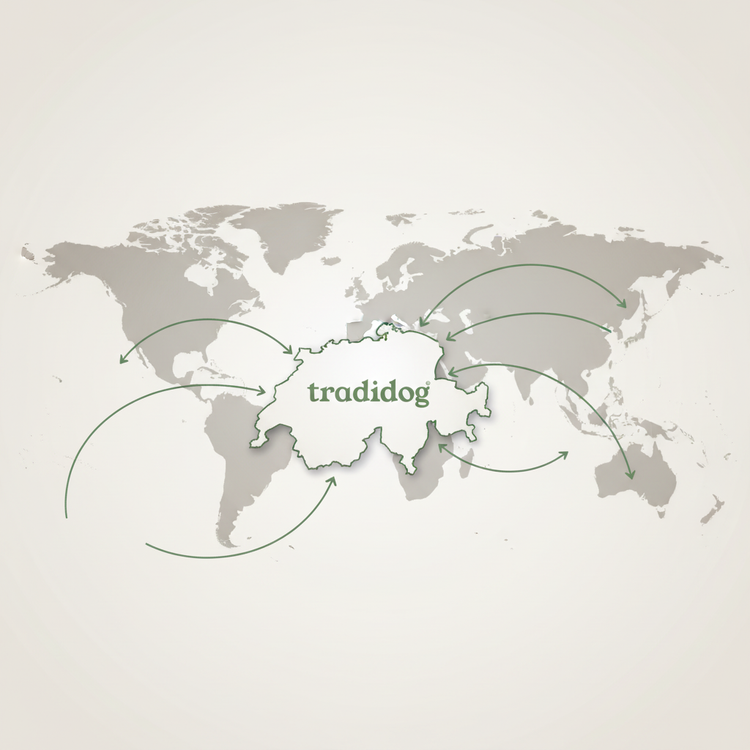Dog knowledge
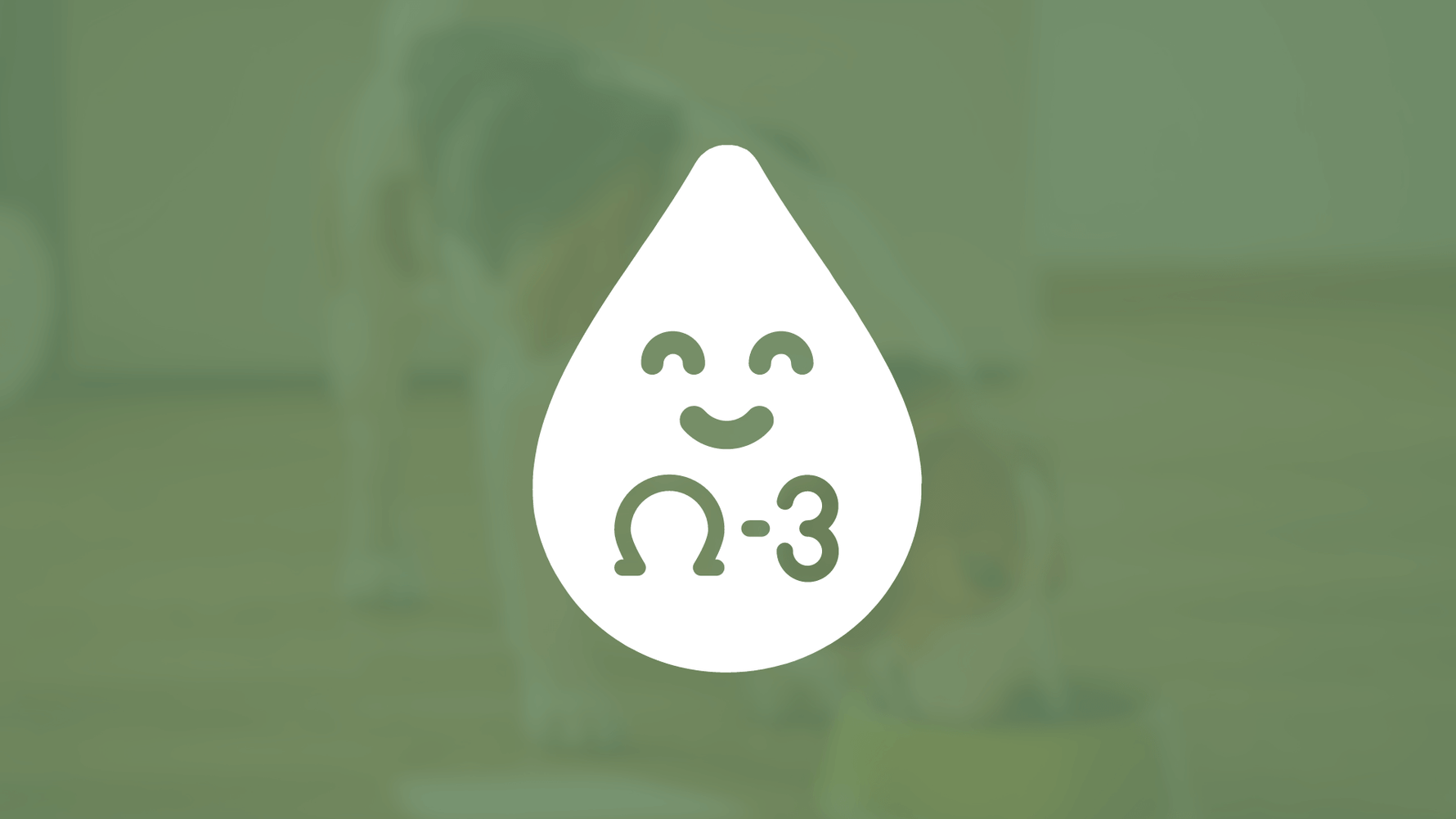
The importance of omega-3 fatty acids for your dog's health
by Friederike Bruhin
on Feb 23 2024
Omega-3 fatty acids are crucial for health in dogs. These essential fats offer numerous benefits and can help your furry companion live a happy and healthy life. In this blog you will learn why omega-3 supply is so important for dogs and how you can ensure that your dog gets enough of it.
Why are Omega-3 fatty acids important for dogs?
Anti-inflammatory effects: Omega-3 fatty acids, such as eicosapentaenoic acid (EPA) and docosahexaenoic acid (DHA), are known for their anti-inflammatory properties. These fats can help reduce inflammation in your dog's body, which is especially helpful for conditions like arthritis and allergic reactions.
Healthy skin and coat: Omega-3 fatty acids help improve your dog's skin health and coat. They can relieve dry skin and itching and ensure a shiny coat.
Immune system support: The omega-3 fatty acids strengthen your dog's immune system and help him fight off diseases better.
Healthy development: In puppies and growing dogs, omega-3 fatty acids are essential for the healthy development of the brain and eyes.
Heart Health: These fats can improve your dog's heart health by lowering blood pressure, reducing triglyceride levels and reducing the risk of cardiovascular disease.
Improved Joint Function: Dogs with joint problems such as arthritis can benefit from omega-3 fatty acids as they can reduce pain and improve joint function.
The best solution for providing your dog with Omega-3: tradidog ®
It is important to note that dogs cannot produce omega-3 fatty acids themselves, which is why they must get them through their diet. The products from tradidog® offer a great opportunity to ensure your dog's omega-3 supply. They are characterized by several advantages:
Sustainability: tradidog® uses rapidly renewable plant resources to obtain omega-3 fatty acids. This helps protect our oceans and fish stocks.
Quality: tradidog® products are carefully manufactured to ensure high quality and purity of the omega-3 fatty acids.
A variety of benefits: In addition to omega-3 fatty acids, tradidog® products also offer other important nutrients that support your dog's health.
Overall, omega-3 supply is a crucial aspect of dog nutrition that should not be neglected. Using tradidog® products can be an excellent way to ensure your dog gets the omega-3 fatty acids they need to stay healthy and happy. Invest in the health of your furry family member and give them the best possible supply of omega-3 fatty acids from tradidog®. Your dog will thank you with vitality and joy of life!

by Friederike Bruhin
on Feb 13 2024
Taking your four-legged friend to work, what could be better for a dog owner! A few years ago, a US professor conducted a study about “dogs in the workplace,” the results of which were very positive. Because having a dog in the office creates a more relaxed atmosphere and stroking a dog also reduces stress hormones.
In our office we sometimes only have one dog and sometimes we have 4 dogs. To ensure that things work well with your dog in the office, we have put together some valuable tips for you.
The dog needs his place of retreat
If you have a large team or several dogs, it is particularly important that your dog has a place where he can rest or sleep undisturbed. At the beginning it is advisable to take a blanket or a bed with you from home, as your dog already knows this. With a toy that your dog likes, he will definitely quickly feel comfortable.
No one should feed your dog without permission
We recommend informing your team that no one should feed your dog. Most dogs notice very quickly where they get a piece of bread at 9:30 a.m. or who eats their yoghurt at 10:00 a.m. and where they could therefore pick up something. This basically poses the risk that your dog will eat something all the time and that he will inadvertently be fed something that is poisonous to four-legged friends. If you want someone to give your dog something every now and then, just give that person a few treats that your dog also tolerates.
The lunch break belongs to your dog
If your dog has been sitting in the office for 4 hours in the morning, he needs the opportunity to do his business and let off steam at lunchtime. The fresh air is also good for us humans during midday. In our store, sometimes other team members without dogs come along for the walk. While the dogs are running, we clear our heads a bit and often have great conversations.
Dog sitter
You cannot take your dog with you to selected training courses or certain business events. For events like this it is always good to have someone who can look after your dog during this time or bring him home quickly on short occasions. If someone has to leave the office at short notice, there is usually someone who is happy to keep an eye on the dog. Even employees who don't bring a dog with them often like to look after the dog for an hour.
Dog to run around freely or on a leash
Whether your dog walks freely in the office or is on a leash at your workplace is very individual and depends on various points. Here I have listed a few for you:
Could your dog get injured somewhere (machines, etc.)?
Could your dog slip away unnoticed?
How does your dog react to strangers (visits at the counter, package delivery person, etc.)?
Is someone on your team perhaps afraid of dogs or allergic?
How does your dog get better rest?
We have 2 dogs with us that run around freely or, better yet, just always lie somewhere and sleep. We also have a dog that is kept on a long leash because otherwise he can't calm down. Overall, in our opinion, there is no right or wrong because everyone knows their dog best and therefore knows what suits them best.
We hope we were able to help you with these tips so that it works great in the office with your dog.
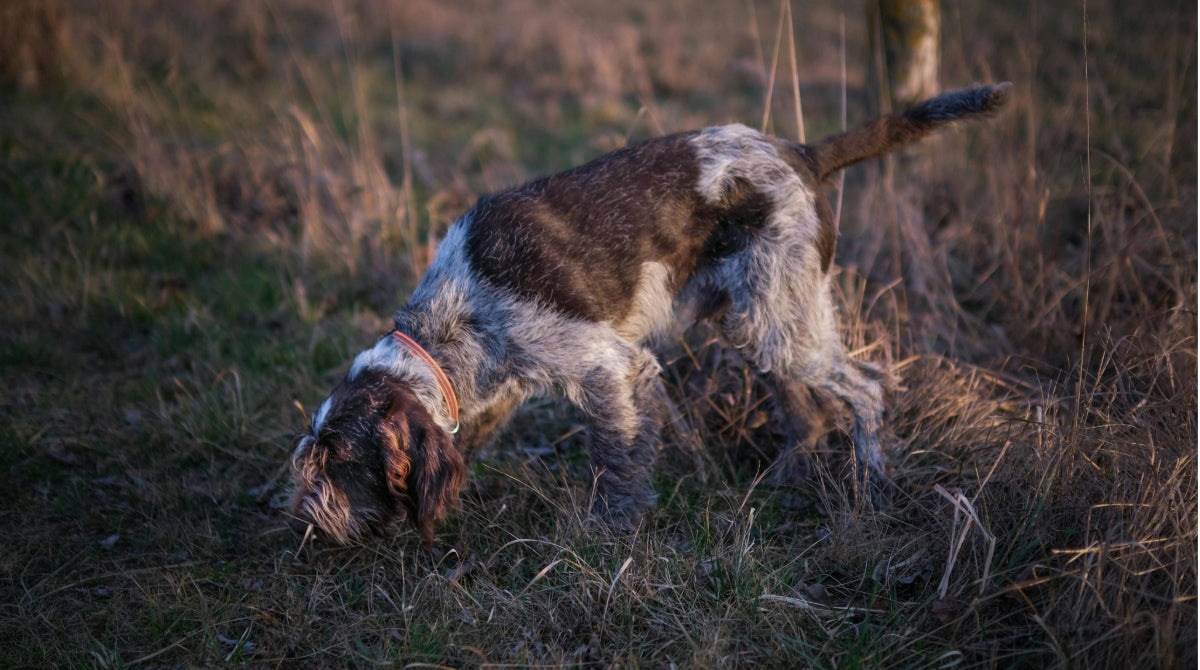
by Kim Rüegge
on Jan 10 2024
You've probably experienced this: While out for a walk, you suddenly hear a loud wheezing sound behind you, as if your dog had just run a marathon. It's almost as if he's trying to tell you, "Hey, I'm here, and this is my way of getting some attention!" But while we often dismiss the noises our four-legged friends make as normal, a persistent wheezing sound can actually indicate a variety of issues that should be taken seriously. In this blog post, we'll take a look at the causes of wheezing, the different types, and how to best deal with it.
1. Causes of wheezing
Dog wheezing can have various causes, and it's important to understand them to find the right response. A common cause of wheezing is obesity. Dogs with too much weight often have difficulty breathing, especially when exerting themselves or lying down. Being overweight can increase pressure on the airways and lead to a wheezing sound.
Another common cause is breed. Some dog breeds, such as bulldogs and pugs, naturally have a shorter muzzle and flatter head, which constricts their airways. This can lead to a chronic wheezing characteristic of their breed.
Additionally, allergies, respiratory diseases, infections, or even foreign bodies in the airways can trigger wheezing. If your dog has persistent wheezing or shows other symptoms such as coughing, nasal discharge, or shortness of breath, it's advisable to consult a veterinarian to rule out serious health problems.
2. Ways to combat
If you determine that your dog's wheezing isn't caused by a serious condition, there are several ways you can help. One of the most effective methods is weight management. Make sure your dog is at a healthy weight to reduce pressure on the airways. A balanced diet and regular exercise can help reduce excess weight and minimize wheezing.
Introducing a special diet for sensitive dogs can also help. There are special foods designed to reduce allergies and inflammation in the respiratory tract.
Here's a little input from us: With food supplements, you're already doing a lot of things right when it comes to nutrition. Visit our online shop or contact us directly. We're happy to help.
Another approach is to adjust your dog's environment. Ensure he lives in a smoke-free, dust-free, and low-allergen environment. Air purifiers and regular cleaning can improve air quality and help reduce wheezing.
If your dog is wheezing due to breed characteristics, there are special dog collars and harnesses that can reduce pressure on the throat, making breathing easier. Regular veterinary visits are also important for early detection and treatment of potential respiratory diseases.
3. Different types of wheezing
Not all wheezing sounds are the same, and the nature of the wheezing can give you clues to the underlying problem. A mild, intermittent wheezing may simply be a sign of overexertion or excitement. In such cases, it's often harmless and will improve on its own with some rest. Perhaps your walks are simply too long or you're too fit.
A deep, steady wheezing sound, especially during sleep, can be common in brachycephalic breeds. It is usually not a cause for concern unless accompanied by other symptoms.
On the other hand, a loud, persistent wheezing accompanied by coughing or gagging may indicate a respiratory illness or allergy. Prompt action is required to ensure your dog receives the necessary medical care.
Conclusion
Overall, your dog's wheezing is a sign you shouldn't ignore, even if it often doesn't sound too bad at first. The causes of wheezing can range from harmless breed characteristics to serious health issues, so it's important to stay vigilant and consult a veterinarian if necessary. Through weight management, a suitable environment, and targeted interventions, you can promote your dog's well-being and potentially reduce wheezing. Ultimately, it's up to you to identify your loyal companion's needs and ensure they stay healthy and happy—even if they wheeze a little sometimes!
Tradidog motto: No matter how hard we try, there's no suitable rhyme for the word "rheumy." So, another reminder: Observe your dog and consult a professional more often than not.
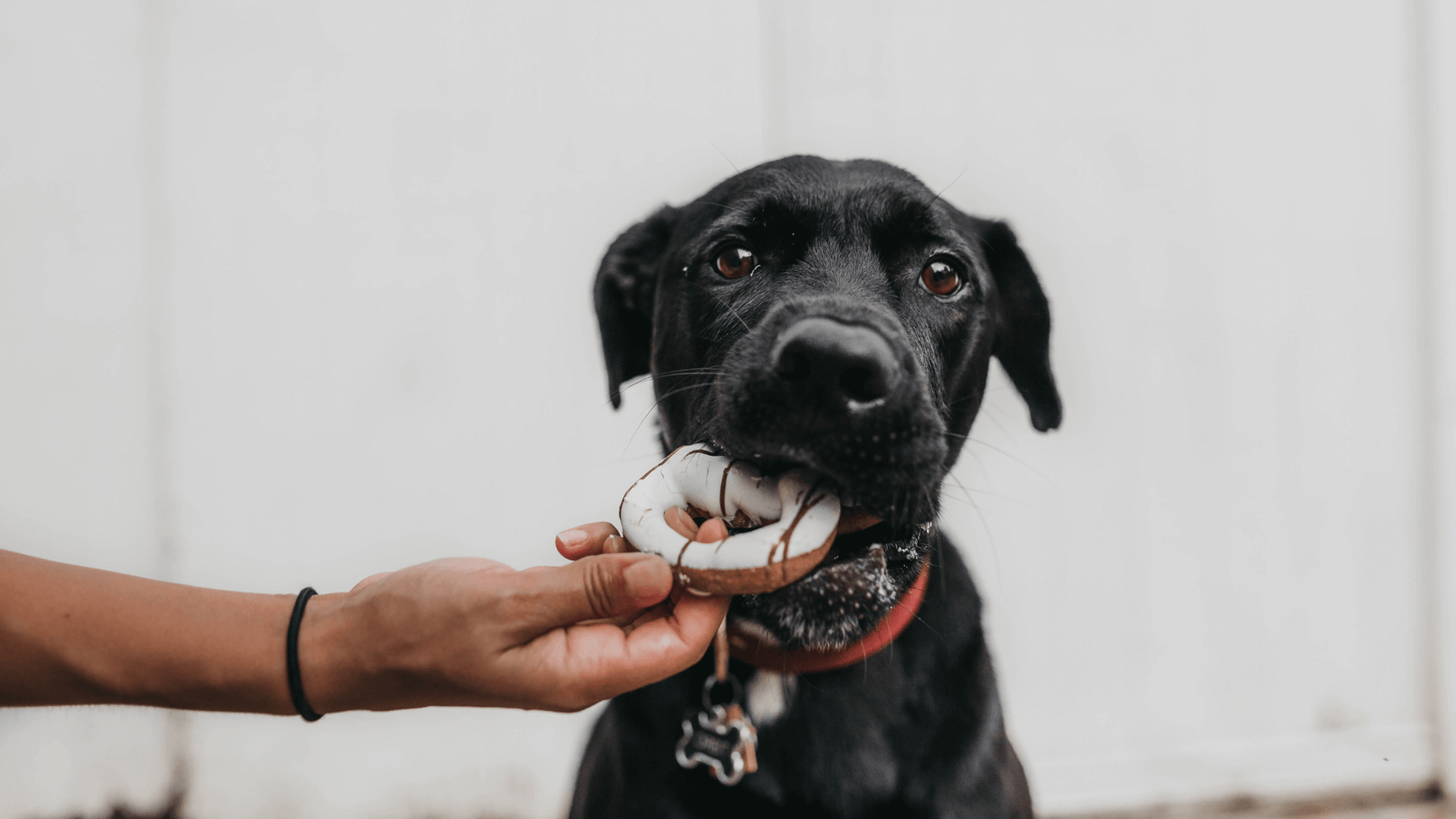
Dangerous foods for dogs – it’s better to be safe than sorry
by Kim Rüegge
on Nov 16 2023
Dogs are loyal companions and members of our families, which is why their health is of course very important to us. Below you will find some foods that are dangerous for your dog. For a detailed list of dangerous foods, we recommend that you look into the topic in detail with your veterinarian.
Chocolate is at the top of the list of no-gos for dogs. It contains theobromine, a substance that is toxic to dogs and can lead to heart problems. Dark chocolate contains more theobromine than milk chocolate, so it is important to keep all chocolate out of reach of our furry friends.
Onions and garlic are other foods that dogs should avoid. They can cause anemia as they contain ingredients that destroy red blood cells. Even in small amounts they can be harmful, so it's always worth making sure your dog doesn't get any leftovers.
Grapes and raisins are also taboo. They can cause kidney failure in dogs due to the oxalic acid they contain. Therefore, caution is advised and even small amounts should be avoided.
Alcohol is extremely dangerous for dogs. It can cause breathing difficulties, vomiting, diarrhea and, in the worst case, death. Therefore, alcoholic drinks should never be placed near dogs.
Avocados are another food that your dog should avoid eating. Avocados contain persin, which is a potentially toxic substance for your dog. While small amounts of persin may be safe for some dogs, excessive consumption can lead to gastrointestinal problems, breathing difficulties, and in severe cases, even heart failure. The danger of persin is concentrated in the pit and skin of the avocado. In addition, the avocado is not recommended for your dog due to its high fat content.
It is important to note that every dog can react differently to different foods and the amount eaten and the size of the dog play a role. If you suspect your dog has eaten something poisonous, it is advisable to visit your local vet immediately. A quick response can save lives.
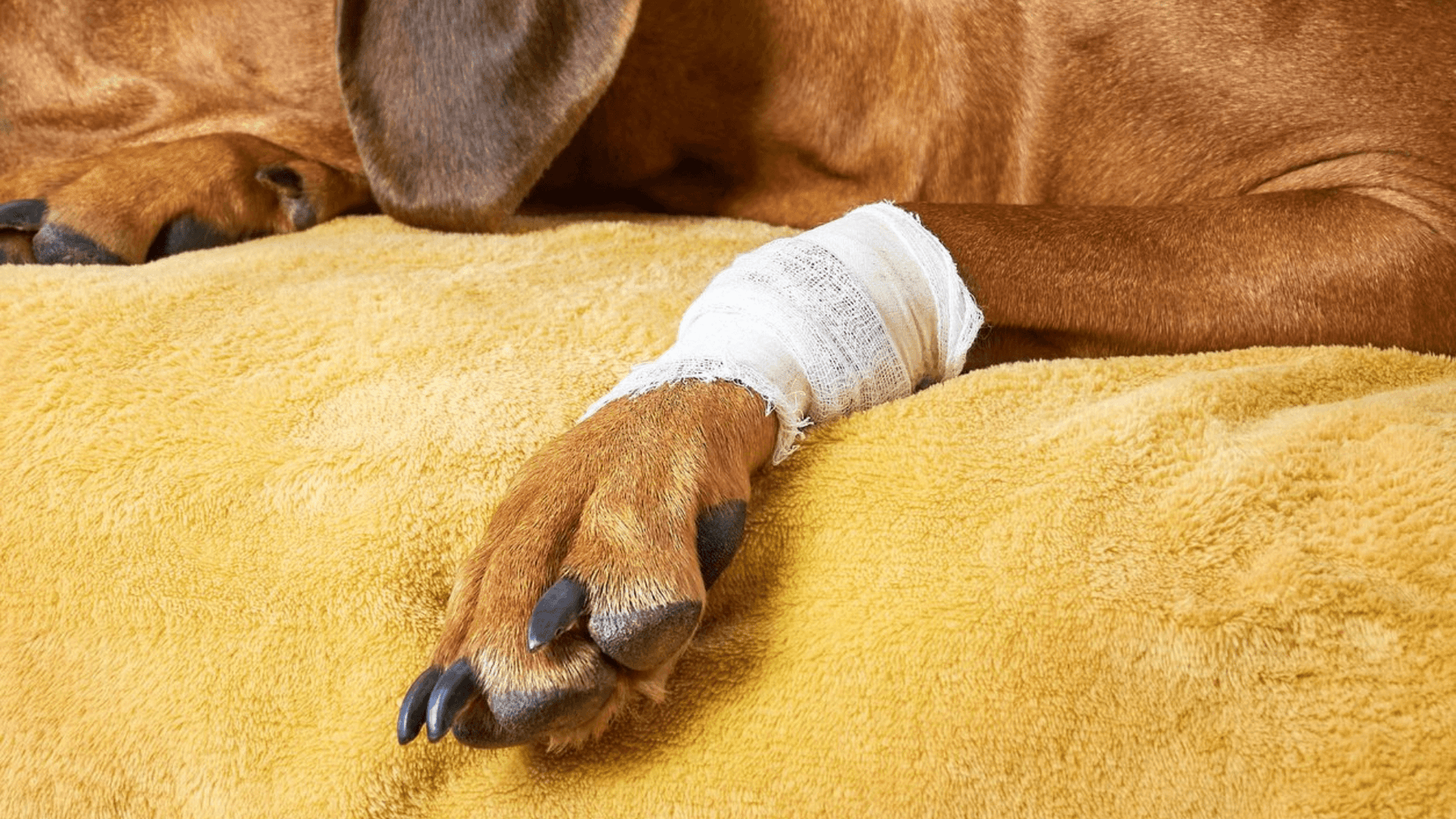
The 10 most common dog diseases
by Kim Rüegge
on Nov 16 2023
Many typical dog diseases are very similar to those of humans. For example, four-legged friends often suffer from gastrointestinal, eye, ear, nose and throat or organ diseases. Or tumors and parasites. This list shows the ten most common dog diseases:
1. Gastrointestinal diseases:
Typical symptoms of dog diseases that affect the gastrointestinal tract are vomiting, diarrhea or constipation. Dogs are omnivores. That's why it often happens that they eat something that they can't tolerate or that even harms them. Parasites can also cause gastrointestinal problems. Stomach torsion in dogs is an acute emergency that requires immediate surgical intervention by the vet. Symptoms include a bloated stomach, gagging and restless behavior. Tradidog can help protect the gastrointestinal tract through the special mucilage in our linseed. These mucilages lay a delicate protective layer over the sensitive organs of the stomach and intestines. In addition, the fiber in the bran, together with the mucilage, supports the binding of bacteria and other pathogens in the body in order to eliminate them. In the case of Tradidog SENSITIVE, we go one step further by helping the dog build a healthy gastrointestinal flora by introducing postbiotic bacteria. These good bacteria gradually replace the harmful ones. During this adjustment phase, our SENSITIVE herbal mixture also helps to alleviate acute symptoms.
2. Parasites
Dogs are particularly susceptible to ticks, fleas, worms and mites. As a rule, parasites are not life-threatening for four-legged friends. However, they can transmit serious diseases such as Lyme disease. Fleas are often carriers of tapeworms. Tick, mite or flea infestations usually manifest themselves as skin rashes. Intestinal parasites can be responsible for dog diseases such as giardia. Such an infection can cause diarrhea and vomiting in dogs. Unfortunately, neither CLASSIC nor SENSITIVE nor any other currently available products have the ability to effectively combat parasites. Nevertheless, we are working intensively on developing a herbal mixture that can serve as a natural defense solution against parasites. It is crucial to note that when medication is used to combat parasites, the dog is optimally prepared for this stress and the pressure on the dog's body can be quickly reduced after medication treatment. In this context, Tradidog can help reduce the strain on the body with its special linseeds and mucilage.
3. Allergies
It is impossible to predict when and why a dog will develop allergies. Among other things, fleas and mites cause allergies in four-legged friends. Certain foods can also cause allergic reactions such as skin rashes, hair loss or itching. But: Unlike people, dogs do not develop respiratory problems if they are allergic. Hay fever, for example, manifests itself as hay itching. Tradidog can help your dog relieve the symptoms and effects of allergies. The OMEGA-3 fatty acids it contains are an effective way to reduce inflammation and discomfort caused by allergies. Still, it's important to emphasize that it's essential to have your dog's allergy checked by a veterinarian. It is advisable not to change the entire basic feed immediately. Often your dog just needs certain nutritional supplements to the basic food, similar to people. There is also the possibility that a generally healthy dog's body is less prone to developing allergies. We are currently conducting a study to demonstrate that the postbiotic bacteria contained in Tradidog SENSITIVE and SENIOR may be effective against allergic reactions.
4. Rashes
Many dogs have sensitive skin. A widespread problem is skin inflammation due to allergic reactions (atopic dermatitis). The cause of this is often contact with allergy-causing substances or an infestation with ectoparasites - i.e. parasites that live on the surface of the host. Lack of grooming can also cause skin rashes in dogs. Tradidog can naturally reduce skin rashes thanks to its OMEGA-3 fatty acids, which have anti-inflammatory properties. Your dog's balanced OMEGA-3 levels allow him to regulate himself and fight inflammation. In addition, your dog benefits from the mucilage, which forms a protective barrier in the gastrointestinal tract and can efficiently remove allergens. For cases of severe and recurring itching and rashes, Tradidog SENSITIVE offers additional support with its anti-inflammatory herbal formula to help your dog fight his discomfort.
5. Teeth
Without proper dental care, dogs also develop dental problems, for example due to tartar. There are special chewing snacks and bones that promise prophylaxis. However, such “Dentastix” often contain a lot of sugar, which in turn can lead to obesity. Dog owners cannot avoid brushing their teeth with a toothbrush. Unfortunately, Tradidog cannot protect against tartar, but we can ensure that your dog has a vital body with our OMEGA-3 fatty acids and special herbal mixtures. This can also have a positive effect on healthy gums, among other things. Healthy gums are just as important as good teeth for your active dog's health and enjoyment of life.
6. Weight problems
Obesity is more common in dogs than weight loss. This can lead to cardiovascular problems or diseases such as diabetes mellitus. Important to know: Your dog usually won't stop eating if you keep putting food in front of him. It is therefore important as an owner to ensure that the dog has a balanced diet and gets regular exercise. Weight problems are a common problem not only in humans but also in dogs in today's society. Various studies have shown that the lack of OMEGA-3 fatty acids in our diet can be a reason for the increasing number of overweight people. This imbalance is also found in dogs. It is therefore very important to keep the OMEGA-3 balance in balance so that the body can regulate itself. The high amounts of plant-based OMEGA-3 in all versions of Tradidog can help prevent cardiovascular disease and also reduce the risk of diabetes. The right diet in the right amount is the key to avoiding such problems. If your dog is already overweight, this is not necessarily due to the amount of food, but can also be due to a lack of essential nutrients, which slows down your dog's metabolism and builds up energy reserves. Therefore, make sure you take the right nutritional supplements and promote healthy liver function. A healthy liver is crucial for the proper functioning of the entire body. Our BOOST herbal blend supports your dog in maintaining healthy liver function.
7. Herniated disc
Smaller dogs in particular suffer from a herniated disc, the so-called gelatinous nucleus of an intervertebral disc breaking through the fibrous ring. Hence the well-known term “dachshund paralysis”. If this gelatinous nucleus presses on nerves, severe pain may result. Because of their long backs, dachshunds are predisposed to herniated discs. Dachshund paralysis occurs in all dog breeds.
8. Hip joint dysplasia
This orthopedic canine condition, a misalignment of the hip joint, is often a problem in larger breeds. It can cause great pain and restricted movement for the animals.
9. Cataracts
Cataracts are one of the most common dog diseases in old age. The eye disease can be treated by surgically removing the cloudy lens. However, the decision for or against the operation should be carefully considered. Dogs can get along very well with their other senses, which are much more developed than humans. For example, they hear and smell much better than we do. Therefore the eye is not their primary sensory organ.
10. Ear infection
A common dog disease is otitis. The ears become inflamed due to bacteria, fungi or parasites. A dark brown mass forms in the inner ear and the ear smells unpleasant. See a veterinarian who will prescribe appropriate medication and show you how to clean your dog's ears.
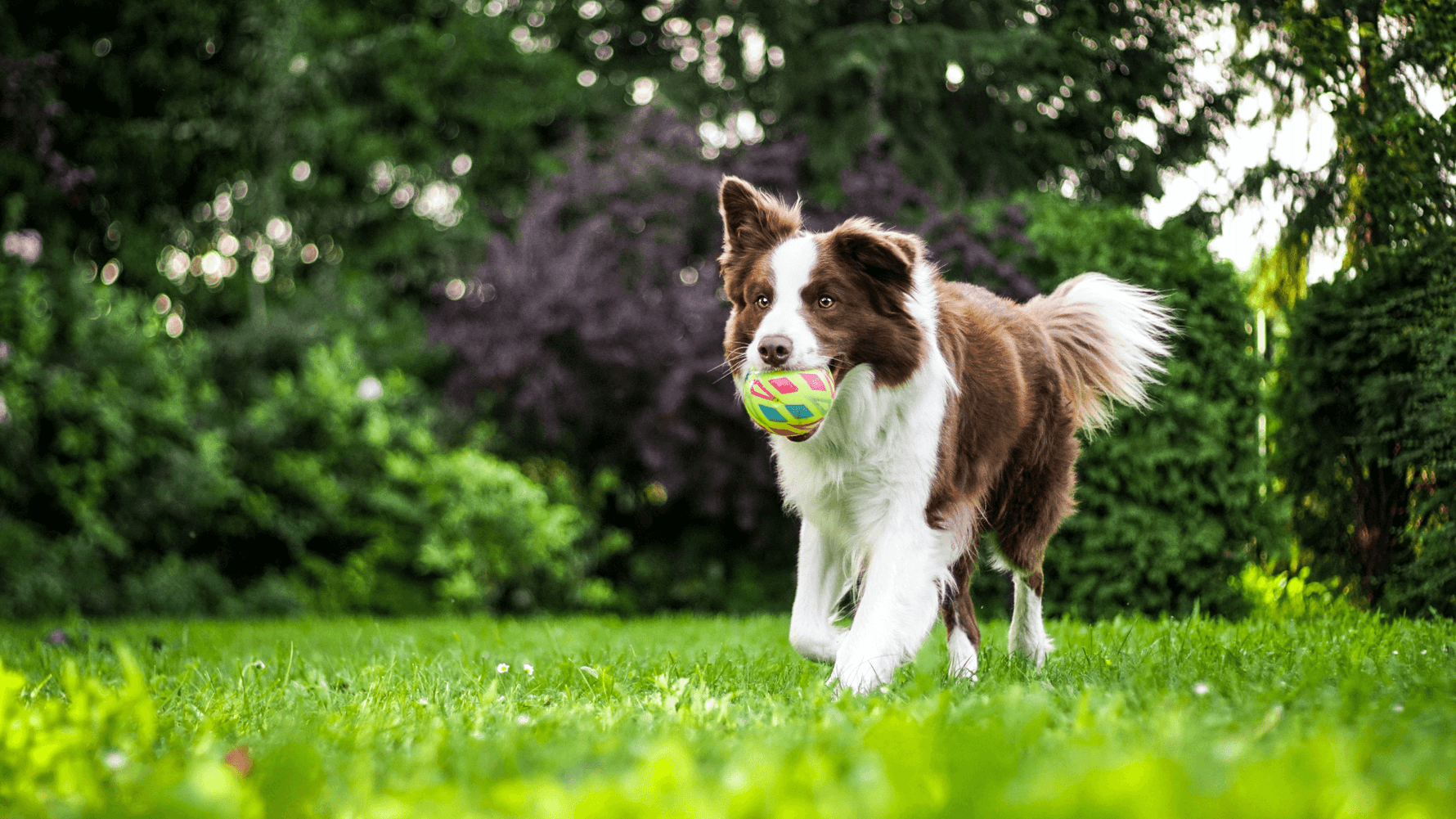
From fiber to exercise: How to support your dog's digestion
by Kim Rüegge
on Nov 16 2023
Digestive problems in dogs are not only very unpleasant for their well-being, but also for us as dog owners. One of the most common digestive problems is constipation. There are various factors that can lead to constipation in dogs. You can help your dog achieve optimal digestion, especially with a diet rich in fiber, sufficient fluid intake and sufficient exercise. In this blog post you will learn how to keep your four-legged friend healthy!
Fiber and your dog's digestion
Fiber is also an important part of a healthy diet for dogs. It promotes digestion and contributes to the dog's overall health. Foods rich in fiber include vegetables, fruits and whole grains. These enable improved intestinal movement and optimized excretion of waste materials. In addition, a high-fiber diet can help your dog maintain a healthy weight by increasing satiety and reducing the risk of cardiovascular disease and diabetes. A balanced diet, rich in fiber and with appropriate fluid intake, is an important factor for healthy digestion in dogs. A food rich in fiber requires a lot of water to achieve the desired effect.
Vitamins and minerals for healthy digestion
Consuming enough vitamins and minerals is also very important for healthy digestion. These nutrients support digestion by strengthening the immune system and preventing inflammation in the gastrointestinal tract. Vitamin B, C and D as well as calcium and iron are particularly important in order to achieve the following:
Vitamin B:
Promotes digestion and helps absorb nutrients
vitamin C
Supports the intestinal flora and inhibits inflammation
Vitamin D:
Important for calcium absorption
Promotes bone health, which has a positive effect on digestion
Calcium:
Important for intestinal health and helps regulate bowel movements
Iron:
Important component of blood
Supports the oxygen supply to the organs including the gastrointestinal tract
Overall, a balanced diet with sufficient vitamins and minerals is essential for your dog's healthy digestion.
Varied diet for good digestion
The same applies to our beloved four-legged friends: the more varied the food, the better the digestion. A balanced diet with meat, vegetables and fruit ensures an optimal supply of nutrients and promotes intestinal health. The different ingredients stimulate digestion and strengthen the intestinal flora. In addition, with a varied diet you ensure good digestion, a shiny coat and healthy skin for your dog.
Exercise as an important factor for your dog's digestion
In addition to a balanced diet and enough water intake, exercise is an important factor for good digestion. Regular walks and extensive play stimulate intestinal activity, which means food is digested better. A good mix of sufficient exercise, a varied diet and sufficient fluid intake contributes significantly to healthy digestion for your dog, so that he feels completely comfortable.
Conclusion
With the right foods, rich in fiber, vitamins and minerals as well as lots of exercise, you can ensure a balanced and varied diet. You also effectively support your dog's digestion and can prevent constipation. In this way you enable your loyal companion to live a healthy and happy life.
